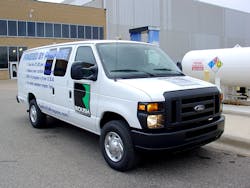Long Beach, CA. Compared to a year ago, the propane message is “starting to resonate,” according to Todd A. Mouw, vice president sales and marketing for Roush CleanTech. Fleet Owner had the opportunity to talk with Mouw as the Alternative Clean Transportation Expo (ACT 2012) kicked off here in Long Beach, CA Tuesday morning.
“Last year, maybe half of the audience might have thought that the price of fuel would go back down again, not now,” Mouw said. “Today fleets feel like they have to have a plan—a way to address the rising cost of gasoline and diesel. We don’t believe there is a single silver bullet; that’s why we are called Roush CleanTech not Roush Propane, but [there is a great case to be made for propane in today’s market.]”
Propane customers, not just the nation’s some 3,000 propane suppliers, are also starting to make that case, according to Mouw. By way of example, he cited customer Tom Armstrong, fleet director for ThyssenKrupp Elevator, which is investing in propane cargo vans for its fleet. "Armstrong talks about what he calls the “five Cs” involved in making an alternative fuel choice," noted Mouw. “Is the solution cost-effective? Does it make commonsense, that is, will it work in your application? Is it clean? Does it conserve? And can you commit to doing it?”
In the case of propane, the answers can all be a resounding “yes,” for many fleets, Mouw said. “You have to be able to make a solution pencil these days," he noted. "Everything has to stand on its own. With or without government subsidies, we can show fleets a return on their investment with propane."
Vehicles fueled with propane autogas emit significantly fewer greenhouse gases and smog-producing hydrocarbons, and virtually eliminate particulate matter when compared to conventional fuels, according to Mouw. All Roush CleanTech vehicles are also certified to meet the guidelines of the Environmental Protection Agency and the California Air Resources Board. Fleet managers who operate on propane autogas can expect to save 30 to 40 percent per gallon when compared to gasoline, he added, and up to 50 percent when compared to diesel.
Mouw also noted that propane meets the conservation requirement hands-down. “Today, there is a bigger interest in using domestically produced fuels than there is in going green,” he said. “People are concerned about national energy security. We have a huge glut of propane and natural gas; we export a billion gallons of propane every year to countries that are ahead of us in seeing its value.”
When it comes to commonsense, he also gave propane power high marks for it performance on the job. "With propane, the new vehicle warranty can stay the same (if the up-fitting is done by an OEM-approved company) and the vehicle’s power and torque stay the same, as well," he noted.
Concerning residual values for propane-powered trucks, there is just not enough data available yet to assign actual values ---as is the case for other alternative power choices, too. “However, if I were to make an educated guess,” Mouw told Fleet Owner, “I’d say that five to ten years down the road, propane vehicles coming off lease will be in high demand. If something happens and that is not the case, you can also always convert propane vehicles back to gasoline before resale. Even if you took at hit at resale, say $1,000, the $15,000 to $25,000 you saved on fuel over the vehicle’s use make that pretty insignificant.”
Mouw also offered some general advice for fleets exploring alternative power options of any kind: “Find a partner that is going to tell you the truth---the good and the bad,” he said. “Then let them help guide you through the process."
Roush CleanTech is displaying a Ford E-450 cutaway at ACT. It is fueled by propane autogas and owned by National Bus Sales. During the ride-and-drive portion of the event, fleet managers can also test the performance capabilities of a Roush CleanTech Ford E-450 shuttle bus, a F-250 pickup truck or an E-250 cargo van.
“No matter the size of a fleet, we have a propane autogas application that will leave fleet managers wondering why they waited so long to make the switch,” said Mouw.
About the Author
Wendy Leavitt
Wendy Leavitt is a former FleetOwner editor who wrote for the publication from 1998 to 2021.
